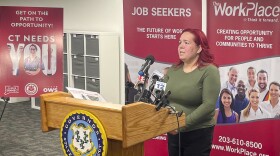Technical high schools used to be thought of as places where kids go to learn a vocation -- things that usually involve manual labor, like HVAC work, or car mechanics.
These days the trend is shifting toward a blend of academics and technical skills.
"Really the catalyst for many of these changes that we see in Connecticut and nationwide is certainly the state of the nation's economy," said Nivea Torres on WNPR'sWhere We Live. Torres is the superintendent of the state's technical high school system, which teaches about 11,000 students.
She said that even kids who want to learn about carpentry, for example, should also be versed in emerging technologies, like renewable energy, to make them more marketable once they graduate.
But the tech schools can't keep up with the demand for what are called middle-skilled jobs.
"We get a lot of calls in the office from folks in the field who are looking for an electrician, who are looking for a plumber, who are looking for someone who is specialized in HVAC," Torres said. "And we try to respond as quickly as possible, but folks in the office will tell you we just don't have enough students to go around."
Budget cuts have also hit the tech system. And earlier this summer, state officials decided to stop admitting students to the two aviation schools, citing problems with new funding rules at the federal level as the cause.
Connecticut's Department of Labor market surveysalso see high demand for many of the technical career paths. Torres says this is one area that can't afford cutbacks, and she's looking to expand partnerships with private industry to enhance her students' access to the job market.





